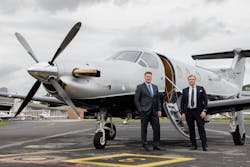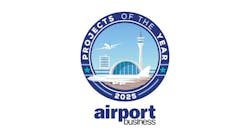Business travel is on the rise. As the world has emerged from the pandemic, organizations are starting to embrace the many benefits of travelling again. Yet, while the numbers are going up, there is a significant pain point: business travel is increasingly onerous.
Business travelers expect a better, more seamless experience than they’re currently receiving. This desire will only become more acute as companies look to cut costs, meaning less convenient travel, lengthy absences from family and gruelling flight connections. We are already seeing business travellers migrating to economy class as budgets are tightened. For example, Air France revealed more than 50 percent of business class passengers are now traveling for leisure or personal convenience, not for business.
Simply put, most people believe that conventional business travel is a grind. Additionally, concerns around the environmental impact of flying have grown as nations look to meet UN sustainability goals. This has created a gap in the market for stress-free, private and more sustainable door-to-door service solutions for business travel. Indeed, by utilizing smaller, more efficient regional airports, the answer is at our fingertips.
The Shifting Landscape
Deloitte research indicates that spending on corporate travel remains 50 percent below pre-pandemic levels. However, the report also predicts that companies should settle into post-pandemic business travel norms in 2023, not as high as pre-pandemic but higher than current levels. According to Deloitte, “Leaders know in-person interaction can be a key component of innovation and growth and will be glad to see more employees get face time with clients and one another.”
In addition, a Global Business Travel Association (GBTA) report predicts business travel will continue to rise into next year, with 78 percent of travel managers surveyed expecting the number of business trips taken at their company to be higher or much higher in 2023 than in 2022.
Also, a trend that shouldn’t be surprising is that travel remains critical for business growth, with 82 percent of UK businesses surveyed by American Express saying that business travel plays a key role in driving revenue, profitability and enabling growth. The survey also indicates that 77 percent of the respondents indicated that their business suffered due to the limited ability to travel during the past two years.
While business travel may mean growth, it doesn’t necessarily mean happy employees. In fact, 55 percent of travelers surveyed by American Express say their overall wellbeing suffers when they travel too frequently, and 71 percent said they would leave their role if their employer didn’t prioritize their wellbeing during their trips. A separate SAP Concur survey of 3,850 business travelers across 25 global markets found that 23 percent of people would look for a new position if their travel schedule didn’t improve.
These reports should raise considerable alarm. Businesses have a duty of care to be offering better travel solutions. After all, a happy workforce means a more productive workforce.
To improve the business travel experience and meet climate goals, the aviation industry needs to focus on a more tailored flying experience that addresses sustainability issues at the same time.
Sustainability at the Forefront
Before looking at those more personalized options, it’s important to remind ourselves just how critical it is that business travel pivots to a more sustainable approach. In Europe, corporate travelers comprise about 12 percent of customers but are responsible for 30 percent of emissions. Companies are increasingly taking sustainability seriously, with 88 percent of GBTA members, plus 100 external stakeholders, saying tackling climate change is the top priority for the business travel sector.
These concerns aren’t only in the boardroom, with 71 percent of UK business travelers worrying about the environmental impact of their trips. In addition, 78 percent indicate they are more conscious of their carbon footprint when traveling than previously.
So, where does that leave the aviation industry? While most commercial planes are too heavy to be electrified and fly long distances, smaller aircraft used in regional air mobility are ideal for electrification. Since the electric aircraft industry is expected to grow 14 percent by 2030, we will see regional airports act as hubs for short-haul flights.
In fact, United Airlines recently announced it expects commercial electric aircraft to come on the market in 2028 in the form of smaller, 30-seater planes that serve regional travel. And in Europe, Sweden and Denmark have committed to making all domestic flights fossil-free by 2030, while Norway wants all short-haul flights departing from its airports to be electric by 2040. In the UK, a 2019 study found that 2.7 million tonnes of CO2 could be saved if domestic flights were electric.
There is much work to be done to decarbonize aviation, and the answers to this issue are complex. While there is no one-size-fits-all approach for cleaning up the aviation industry, the electrification of short-haul flights will be a critical part of flying us to a zero-emission future.
The Regional Solution
A NASA report from last year outlined that technological advances in aviation mean that utilizing the planet’s 36,000 regional airports will make flights in smaller planes greener and more affordable.
As well as being a breeding ground for electric aircraft, regional airports offer a more efficient and personalized solution to business travel. By taking advantage of the network of regional airports, you can create a door-to-door flight-embedded service with direct connections. These networks will save business travelers time and, by optimizing flights, reduce travel expenditures and carbon footprints, which is - crucial with conventional business travel costs set to rise throughout 2023.
What do we mean by optimizing flights? At Lygg, our model aggregates corporate demand for shared routes and destinations. By pooling the travel needs of multiple companies from the same region, we can open up routes from regional airports to their chosen destinations. We can do this for a specific period, whether on a short-term or long-term basis. If any seats are remaining, they will be sold to business travelers to piggyback on the flights.
Flying between regional airports allows direct flights to be scheduled at a time convenient to the businesses making the booking. Providing private transport to and from regional airports, is a far more comfortable curb-to-aircraft experience, which can often be tedious and time-consuming when flying from large airports.
With more simple and comfortable travel experiences, we can not only improve employee wellbeing but help deliver a greener future for the planet and ensure businesses continue to leverage travel to grow and drive revenue. Fundamentally, we believe we are on the path to decentralized, zero-emission private business travel for the masses.
Roope Kekalainen is an experienced aviation professional with an extensive background in aviation management and commercial pilot of ATRs. Previously, he was the founder and chairman of the board of Private Skies, a leading European aircraft brokerage. He was responsible for achieving one of the first pan-European Aircraft Operator Certificates for single-engine commercial operations in 2016.
Jari-Jussi Viinikkala is an accomplished investment banker and CFO of Lygg. Jari-Jussi worked at HSBC in New York and London, where he headed HSBC Financial Institutions’ Nordic team and largest Asian FIs coverage, generating +$90m in revenue per annum globally. He is a graduate of the University of Manchester and Manchester Business School in Finance and Economics, with an MSc in Finance from Imperial College London.






